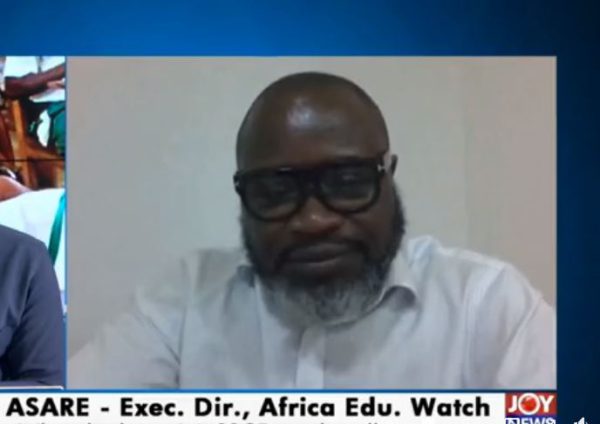The Executive Director of Africa Education Watch, Kofi Asare has identified a lapse in the country's education system.
According to him, the education system has an equitable challenge, adding that the distribution of quality and access has been the biggest challenge.
“By quality, I am talking about the distribution of quality learning outcomes. That is the biggest challenge in our education system in this country,” he said in an interview on PM Express on Wednesday.
This, he is said can be blamed on uneven distribution of learning outcomes within the system across the rural and urban divide and private and public schools.
“The test of quality in our educational system is always to be based on how equitable learning outcomes are distributed and not necessarily the national average.
“The national averages are always misleading because there it doesn’t give an idea about the most important thing which is the extent to which quality is being distributed in terms of learning outcomes amongst deprived schools and endowed schools,” he explained.
Citing an instance in the regional level performance in WASSCE, he said: “between 2017 and 2019, our analysis of the waited average scores or pass rate in WASSCE indicate that whiles WAEC was scoring higher, sometimes up to 48%, 47% and 48% of all students passing between A1 and C6 if you take the analysis at the regional level, you come to the conclusion that in Upper West region for instance 30 SHS, the highest was 0.6% which was Nandom SHS."
“So the national one was about 46, 47 before we got to 50 in 2020. But as at 2019, the highest in that Region as part of 30 schools was Nandom with 0.68. Now 14 schools scored 0% between 2017 and 2019 and if you look at the distribution of the schools, 6 were in Upper West and the remaining in Upper East,” he said.
His assertion come after the West African Examination Council (WAEC) announced the release of the provisional results of 2021 WASSCE candidates.
The Council in a press statement issued on Wednesday by the Head of Public Affairs, Agnes Teye-Cudjoe, indicated that there has been a decline in the performance of candidates in Mathematics and English Language in this year’s West African Senior School Certificate Examination (WASSCE) as compared to that of last year.
The drop was from a percentage of 65.71% to 54.11 %.
Also, touching on Free SHS, he said the Free SHS has not aggravated the inequities he highlighted in the education system nor has it helped to improve it.
According to him the challenges in education have been in existence before the birth of the Free SHS policy.
He, therefore, urged the policymakers not to be carried away by the national data but “be circumspect in respect of how the national-level data is positively impacting on deprived districts.”
Latest Stories
-
Two girls and one employee killed after explosion at Nebraska biofuels plant
18 minutes -
Analysis: Ghana’s gold exports surge in 2025, surpasses total imports for first time in a decade
28 minutes -
GH¢2bn was on the table, why collapse uniBank? – Prof Lord Mensah questions closure
29 minutes -
Mahama reiterates gov’t’s commitment to expand Damongo Water Supply system
37 minutes -
Bank of Ghana tightens rules on remittances amid compliance failures
43 minutes -
Gov’t releases $1m to avert Memphis University scholarship crisis
50 minutes -
President Mahama rallies African leaders to empower reparations bodies
1 hour -
Parliament endorses use of oil and mineral revenues for ‘Big Push’ projects
1 hour -
Prioritise funding to security agencies- Ntim Fordjour urges gov’t as he critiques Mid-Year Budget Review
1 hour -
NPP leadership, Minority Caucus sign Daddy Lumba’s book of condolence
1 hour -
Defence Minister hails Ghana–China military ties at PLA anniversary event
1 hour -
Absa Black Star Marathon draws global participation and presidential endorsement
1 hour -
Gender Minister calls for review of Human Trafficking Act
2 hours -
Yagbonwura pays a historic visit to President Mahama
2 hours -
We’ve not apologised for GH¢138.9bn public debt overstatement – Audit Service
2 hours

